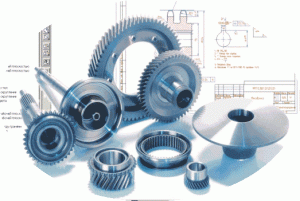Long before the word engineer had been coined, people had been developing vital inventions based on mechanical principles to give us the fundamental things we now take for granted. With all of the technology we have at our fingertips today, it is impossible to imagine what life was like before some talented and determined engineer came up with the seemingly simple concept of a wheel!
 Engineering can generally be separated into these four key areas:
Engineering can generally be separated into these four key areas:
- Chemical Engineering – Includes applications of physics, biology and chemistry combined with engineering processes.
- Civil Engineering – Infrastructure and construction
- Electrical Engineering – All electrical and electronic systems.
- Mechanical Engineering – All physical and mechanical systems.
The following brief guide takes a look at some of the key names and inventions throughout the history of engineering.
THE ANCIENT ERA
Civil and military engineers from Ancient times left the legacy of their brilliance, skill and talent in some of the landmark structures that remain with us today, for example; the Pyramids, Aqueducts, the Coliseum and the Great Wall of China.
- IMHOTEP (2700 BC) – Widely considered to be the first known civil engineer, Imhotep, one of the chief officials of the Pharaoh Djoser is believed to have been the first to develop the use of columns to support buildings and also the person thought to be responsible for the design and construction of the stepped pyramid of Djoser. This first Egyptian pyramid is the earliest known construction to be built from cut stone on a large scale.
- ARCHIMEDES (287 – 212 BC) – This mathematical genius gave us fundamental mechanical inventions, developing the principle of leverage, block and tackle pulley systems and innovative gear mechanisms that were used much later in the development of gear trains.
THE MIDDLE ERA
- AL-JAZARI (1136 – 1206) – This mechanical engineer and great inventor created machines that could raise water. He also gave us the cam shaft, an early crankshaft and introduced numerous groundbreaking ideas, mechanisms and devices, including the first mechanism that enabled us to control the rotation of a wheel; known as the ‘escapement mechanism’.
THE RENAISSANCE ERA
By now, engineering was a recognised and fast growing profession.
- WILLIAM GILBERT (1544 – 1603) – The first electrical engineer, coins the term electricity. Known as the ‘father of electrical engineering’.
- THOMAS SAVERY (1650 – 1715) – Brilliant mechanical engineer builds the very first steam train. This breakthrough opened up the possibility of mass production and eventually led to the Industrial Revolution.
THE MODERN ERA
- WILLIAM STURGEON (1783 – 1850) – Great British scientist invents the first working electric motor and the first electromagnets.
- JAMES MAXWELL (1831 – 1879) & HEINRICH HERTZ (1857 – 1894 AD) – Their leading work gives rise to the field of Electronics.
- JAMES WATT (1736 – 1819) – His pioneering inventions during the Industrial Revolution developed specialist machines and tools lead to huge growth in the field of Mechanical Engineering.
- ALAN EMTAGE (1964 – present) – Computer engineer builds the first search engine!
Demand created by mass production during the Industrial Revolution leads to the development of completely new materials and chemical processes. A new industry of chemical engineering develops and grows.
Developments in Aeronautical and Aerospace Engineering at the start of the 20th century lead to the first successful aircrafts and later space travel.
Other new and increasingly sophisticated technologies including microelectronics, computers, mobile phones and the Internet are key features of an information revolution where we see machines become a key feature and fundamental part of everyday life.
TODAY
Over the years, through trial, error and sheer ingenuity, talented engineers from all walks of life have developed technologies and concepts that have changed the shape of our world. Experts within the high tech engineering sector today, continue to deliver cutting edge technologies, producing precision engineered equipment and components to be used in the following industries;
- Defence
- Aviation
- Aerospace
- Electronics
- Scientific
- Motorsport
With technology advancing so rapidly – who knows where the engineers and great minds of today will lead us to tomorrow?










